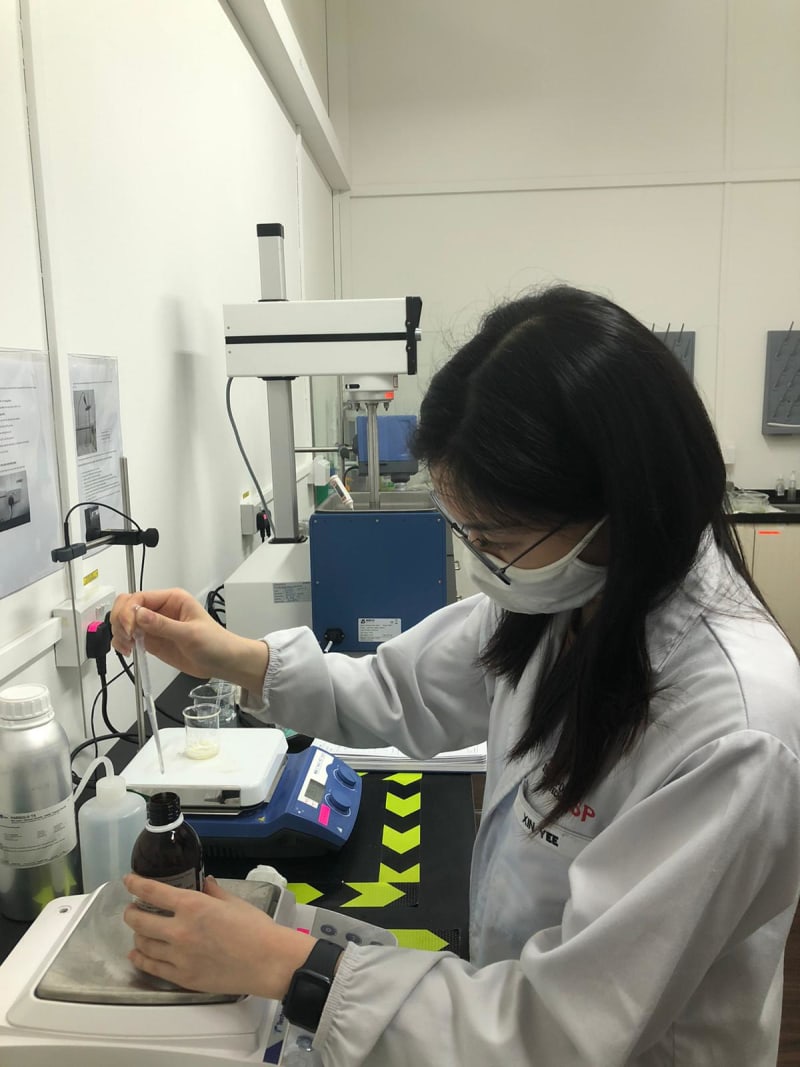
Biography
Can you introduce yourself and tell us a bit about what you do?
I’m Claira and am born and based in Singapore, where I currently work as a Product Development Specialist for a skincare startup company.
I am now managing 4 exciting projects, which can be super tiring but fulfilling as I get to witness the start to end of the NPD (New Product Development) process and one day, see my products on the market!
What have you been working on since graduating?
I am responsible for producing the product concept briefs and then developing its formulation. Being the independent technologist in my company, I have been revising the foundation of cosmetic science, such as going through the technical basics of formulation technology etc, all that geeky stuff. It does feel different when theory becomes applied to real life.
What attracted you to LCF and why did you decide to study MSc Cosmetic Science?
I was already taking a course in Perfumery and Cosmetic Science in Singapore Polytechnic when a UAL representative came down to introduce us to the course. At the point of time (and even now), there were not many recognised universities offering a degree/ master’s in Cosmetic Science. And mine was an integrated master’s program, which makes it even more unique and special.
And of course, I was excited to experience life in London for a bit.
Did you always know you wanted to pursue a career in cosmetics?
Definitely! I was exposed to skincare from a very young age and was always curious with what the ingredients on the labels meant.
What keeps you inspired?
The personal care industry is so so big and valuable yet having a career in it is considered niche. Being in this industry made me witness many trade secrets. Many people are reliant on this industry to look good and feel good, which gives me a sense of responsibility and mission to develop cosmetics that are sustainable and humble, to both consumers and the environment.
How have you maintained your creative practice during the pandemic?
During the pandemic, I was fortunate to be able to resume work in the office and laboratory. So, I was not affected much. However, certain projects had to be paused due to delays in shipment, hence I focused more on NPD and formulating work.
I am stronger in hands-on and would occasionally escape to the laboratory to secretly experiment with the latest ingredients (or even making them into usable skincare products and then trying it on myself! Haha)
Since my master’s project focuses on the replacement of synthetic thickeners with natural hydrocolloids, I would get that sense of nostalgia whenever I am working with them.
What are your plans for the next few years? Where would you like to see yourself professionally?
To be able to develop anything on hand really, different format of products requires different disciplines, and I am still working on that.
Looking forward, I would like to see myself as part of management, doing a bit of business development and, managing a team of junior developers/ formulators so there can be a continuous replenishment of creativity which this industry needs!
What did you enjoy the most about the course?
I appreciate that the course helped us transition into the industry better. For example, there were some visits by external speakers from reputable personal care companies that would give us some lectures; or us heading to conferences to participate in networking and connect with the suppliers.
Can you tell us a bit about your favourite project completed on the course?
It was my master’s project, where I dedicated the hardest work I had ever given. It was regarding the feasibility (sensorial wise), on the replacement of a common synthetic thickener with natural alternative(s).
I had to first create hydrogels of the benchmark (synthetic thickener) and the hydrogels of the replacements (natural thickeners). I would then use instruments to measure their behaviour. Since no natural thickener (from my range) will match the benchmark completely, I would combine 2-3 natural thickeners together and try to completely match the behaviour of the benchmark.
With the best alternative I developed, I used human panellists to test the benchmark and the alternative and asking them if they felt a difference between those or not.
Their answer would then determine if my project was a success or not.
Best advice you received from a lecturer, tutor or technician during your time at LCF?
I remember my tutor said something like this, “Don’t just rush to success, take in the process and you may be awarded with something bigger.”
In university, everyone strives for the best, for the best result they can achieve. But they might neglect the process which defeats the purpose. Success is usually a complicated path, not a straight one.
What advice would you give to potential students who would like to enrol on this course?
Do not neglect the resources LCF have! Especially the library, there is so many books you can borrow to build up your extra learning from there.
Also, do not give up easily! There can be several routes to achieve the same endpoint, but you may end up with insights which can be full of surprises.
Work hard, but also work smart.